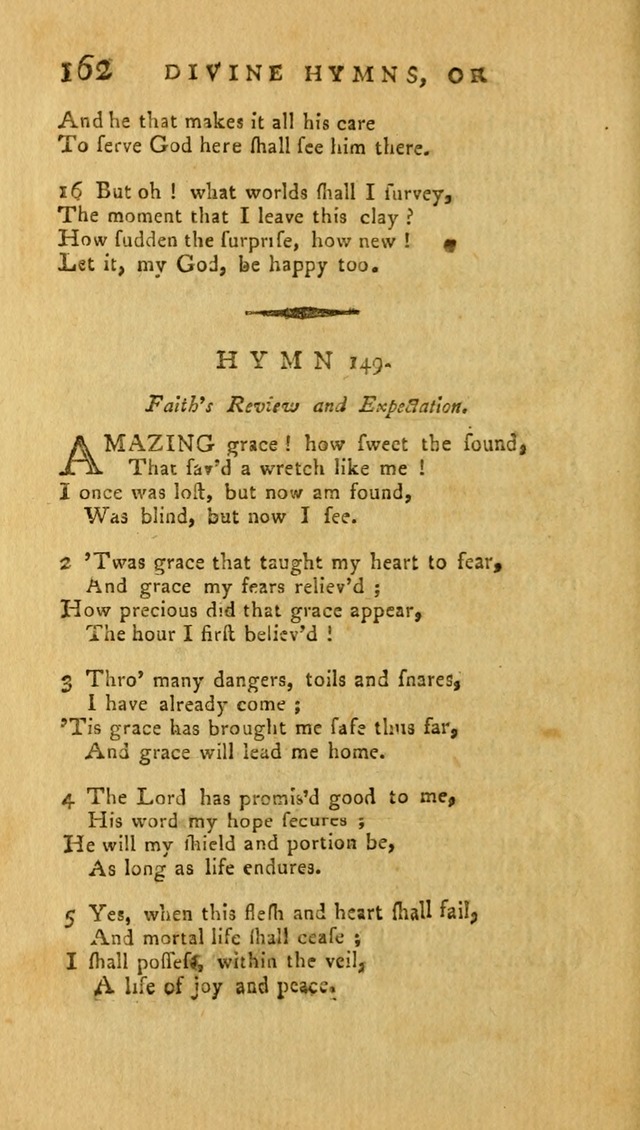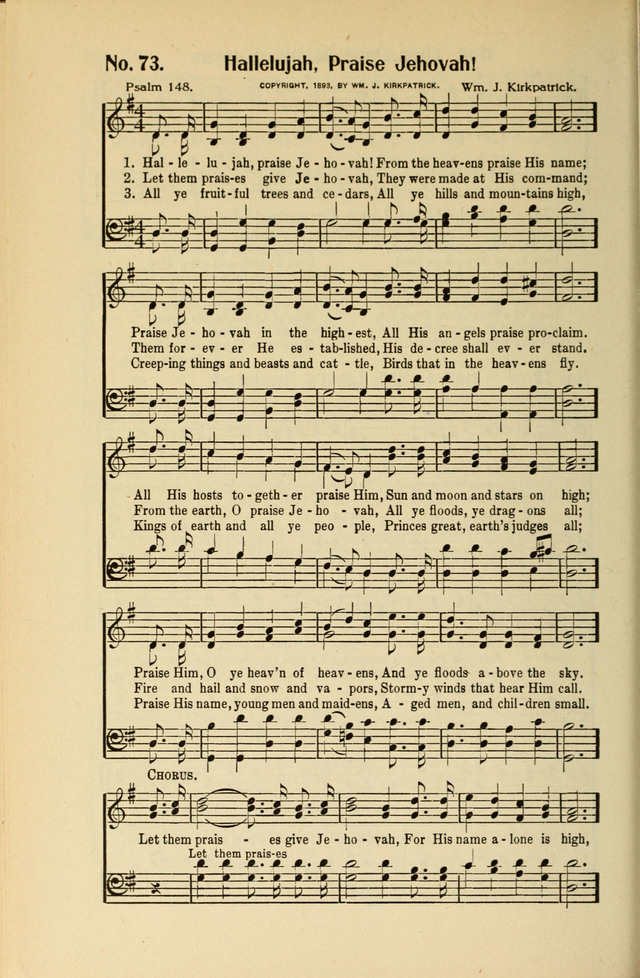Blog
M. W. Bassford
The 50 Greatest Hymns of All Time, Revised
Monday, May 04, 2020
Based on input from various readers, I’ve removed four hymns and added four others. The changes are below. Also, it’s likely that I will offer a “lessons learned” post later in the week.
Abide with Me (1847)
All Hail the Power of Jesus’ Name (1779)
All People That on Earth Do Dwell (1560)
IN: Amazing Grace (1779)
Be Still, My Soul (1752)
Be with Me, Lord (1935)
OUT: Footprints of Jesus (1871)
For the Beauty of the Earth (1864)
Give Me the Bible (1883)
Great Is Thy Faithfulness (1923)
Hallelujah! Praise Jehovah! (1893?)
Hallelujah! What a Savior (1875)
He Hideth My Soul (1890)
Higher Ground (1892)
OUT: How Deep the Father’s Love (1995)
How Firm a Foundation (1787)
I Am Thine, O Lord (1875)
I Need Thee Every Hour (1872)
In Christ Alone (2001)
In the Hour of Trial (1834)
It Is Well with My Soul (1873)
Jesus, Draw Me Ever Nearer (2001)
IN: Jesus Loves Me! (1860)
Just As I Am (1834)
Lord, We Come Before Thee Now (1745)
My Jesus, I Love Thee (1862)
Nearer, My God, to Thee (1840)
Nearer, Still Nearer (1898)
IN: O Thou Fount of Every Blessing (1758)
O Worship the King (1833)
On Zion’s Glorious Summit (1803)
Only in Thee (1905)
Our God, He Is Alive (1966)
Purer in Heart, O God (1877)
IN: Rock of Ages (1776)
OUT: Something for Thee (1862)
Stand Up, Stand Up for Jesus (1858)
Sun of My Soul (1820)
Sweet By and By (1867)
Sweet Hour of Prayer! (1845)
Take Time to Be Holy (1874)
OUT: Teach Me Thy Way (1919)
The Battle Belongs to the Lord (1985)
The Last Mile of the Way (1908)
The Solid Rock (1836)
There Is a Habitation (1882)
This World Is Not My Home (1919)
Though Your Sins Be as Scarlet (1887)
‘Tis Midnight, and on Olive’s Brow (1822)
Trust and Obey (1887)
Victory in Jesus (1939)
We Saw Thee Not (1834)
When I Survey the Wondrous Cross (1707)
Why Did My Savior Come to Earth? (1892)
The 50 Greatest Hymns of All Time
Friday, May 01, 2020
I generated this list using three criteria:
- DOCTRINAL DEPTH. Does the hymn have something spiritually meaningful to say? Is its meaning profound or superficial?
- CONGREGATIONAL SUITABILITY. Is the hymn simple enough that an average a-cappella congregation (80 in attendance on Sunday morning) can sing it easily?
- CONGREGATIONAL APPEAL. Do worshipers enjoy singing this hymn? Is it widely used?
Additionally, I did not consider (and will not include) any hymn written by me or by anyone I know to avoid introducing bias.
There are many worthy hymns that did not make the Top-50 cut. If you think an omitted hymn should be on the list, leave a comment identifying both it and the hymn that you think it should replace. You may change my mind!
Abide with Me (1847)
All Hail the Power of Jesus’ Name (1779)
All People That on Earth Do Dwell (1560)
Be Still, My Soul (1752)
Be with Me, Lord (1935)
Footprints of Jesus (1871)
For the Beauty of the Earth (1864)
Give Me the Bible (1883)
Great Is Thy Faithfulness (1923)
Hallelujah! Praise Jehovah! (1893?)
Hallelujah! What a Savior (1875)
He Hideth My Soul (1890)
Higher Ground (1892)
How Deep the Father’s Love (1995)
How Firm a Foundation (1787)
I Am Thine, O Lord (1875)
I Need Thee Every Hour (1872)
In Christ Alone (2001)
In the Hour of Trial (1834)
It Is Well with My Soul (1873)
Jesus, Draw Me Ever Nearer (2001)
Just As I Am (1834)
Lord, We Come Before Thee Now (1745)
My Jesus, I Love Thee (1862)
Nearer, My God, to Thee (1840)
Nearer, Still Nearer (1898)
O Worship the King (1833)
On Zion’s Glorious Summit (1803)
Only in Thee (1905)
Our God, He Is Alive (1966)
Purer in Heart, O God (1877)
Something for Thee (1862)
Stand Up, Stand Up for Jesus (1858)
Sun of My Soul (1820)
Sweet By and By (1867)
Sweet Hour of Prayer! (1845)
Take Time to Be Holy (1874)
Teach Me Thy Way (1919)
The Battle Belongs to the Lord (1985)
The Last Mile of the Way (1908)
The Solid Rock (1836)
There Is a Habitation (1882)
This World Is Not My Home (1919)
Though Your Sins Be as Scarlet (1887)
‘Tis Midnight, and on Olive’s Brow (1822)
Trust and Obey (1887)
Victory in Jesus (1939)
We Saw Thee Not (1834)
When I Survey the Wondrous Cross (1707)
Why Did My Savior Come to Earth? (1892)
The Root of Bitterness
Wednesday, April 29, 2020
Most of us have had experience, invariably bad, with bitter people. Something has happened to them that they have continued to resent for years or decades, and they often take out their resentment on those who are closest to them. Frequently, we turn to Hebrews 12:15 for a Biblical condemnation of such behavior.
Because Hebrews 12:14 emphasizes the importance of pursuing peace with others, I think this is a correct reading of the text. It makes sense in context. However, the Hebrews writer is saying more here than we commonly credit.
The concept of a root of bitterness does not appear for the first time in Hebrews. Instead, the writer is paraphrasing Deuteronomy 29:18, which warns against those who are roots that bear poisonous and bitter fruit. However, in the context of Deuteronomy, such people aren’t quarrelsome and resentful. Instead, they are idolaters. They cause widespread trouble because they lead others away into idolatry.
At first glance, it appears that the Hebrews writer has missed the point of the quotation from Deuteronomy 29. However, given the great skill with which the writer (to say nothing of the Holy Spirit!) uses the Old Testament through the rest of the book, this is extremely unlikely. Instead, he has left an additional lesson for those who are familiar with the Law of Moses too.
He wants us, in fact, to recognize that bitterness is a form of idolatry. After all, the New Testament frequently reminds us that idolatry does not necessarily involve worshiping a golden statue. In Colossians 3:3, Paul notes that greed is a form of idolatry. People who care about money and stuff more than anything else are bowing down to Mammon, whether they recognize it or not.
However, we can take the analysis one step further even than that. When we are greedy, it’s not really the money and the stuff that we value. It’s the way that they make us feel, and we prize that feeling so much that we are willing to abandon God and do evil in order to experience it. When it comes to covetousness, the idol we are worshiping is the self.
The same is true for bitterness. People who can’t move past a wrong that they have suffered are resentful because it is a wrong that they have suffered. Somebody has hurt them, or hurt somebody close to them, and that’s the unforgivable sin, because it is a wrong that has touched their precious, invaluable self. This is so great a violation of the way that they think things ought to be that they feel justified in mistreating the wrongdoer, or even in mistreating an innocent third party.
As a result, they repeatedly express the outrage they feel at their own injury by injuring others, often until the end of their lives. Even if people like this faithfully attend worship services, Jesus is not and cannot be the Lord of their hearts. He cannot be most important to them, because nothing is more important to them than they are.
They are their own miserable, spiteful idols.
When Jesus exhorts us to be merciful and forgiving, then, He does not merely do so because mercy and forgiveness are good. Instead, it is because being merciful and forgiving is a necessary part of subjecting ourselves to Him. When we place so much importance on ourselves that we refuse to forgive, we reveal that we have been defiled by the idol of selfishness in our hearts.
More Than Conquerors
Tuesday, April 28, 2020
By now, most of us have realized that shelter in place ain’t no fun. Thankfully, in Maury County, TN, there have been few who have contracted coronavirus, and even fewer who have died from it. If all continues according to plan, in a few days, many of the restrictions that have prevented us from assembling will be relaxed. It is likely, though, that the economic effects of social distancing will be felt here for months to come.
For a moment, let’s take a grim view of that future. Suppose that the recession of 2020 is both deep and prolonged. Suppose that the ‘rona makes a much more deadly return. Suppose, in fact, that problems we haven’t even imagined yet rear their ugly heads.
Know what? For Christians, none of that makes any meaningful difference because it does not alter the relationship between God and us. Our brethren in the first century faced problems far worse than any of us are likely to see, but they remained triumphant through it all. This morning, let’s examine the back half of Romans 8 to see how we can remain more than conquerors.
This begins with an examination of GOD’S PURPOSE. Let’s read here from Romans 8:18-30. In this reading v. 28 is one of the most famously Pollyanna-ish verses in the whole Bible. How can it possibly be true that all things work together for good for God’s people when we regularly endure suffering, tragedy, and heartbreak?
Paul, of course, was no Pollyanna. In what we just read, he refers to the sufferings of the present time. A little later on in the chapter, he discusses trials like being executed because of our faith in Christ. His point is not that our suffering is not real, nor is it that every trial we face was crafted by God for our enjoyment. Instead, he’s telling us that our reward is so great that next to it, our suffering pales into insignificance.
He explains this particularly with reference to this physical creation. We live in a fallen world that is replete with suffering. However, it exists for a noble purpose—to reveal who God’s children are. As a result, even when our misery is so great that the whole creation can be said to be groaning, those groans are not the hopeless groans of the terminal cancer patient. They are the hopeful groans of the woman in childbirth. Even though the present may not be wonderful at all, the future that it is certain to produce will be wonderful.
In addition to the groaning of the creation as it strives for this wonderful future, Paul mentions two other groaners. We ourselves are groaning as we long for the resurrection, and so is the Spirit of God as He intercedes for us. We are not satisfied with the imperfection of this life, and neither is God satisfied with our position. However, our groaning and the Spirit’s groaning are going to be fulfilled too. Together, the creation, we ourselves, and the Spirit are the “all things” that are working for our good.
We can be certain of what God will do for us because of what He has done for us. After all, we were dead in our sins, but He foreknew, called, justified, and glorified us. When we consider our position as those who have been raised up with Christ in heavenly places, we can rest assured that our future will be even more glorious.
Here’s what this means for us. I know some of the brethren here are suffering intensely for various reasons. It is likely that the future holds intense suffering for all of us somewhere. However, unlike the suffering of everyone else, our suffering is endurable because of our hope. Earthly suffering is limited in time, and it is limited by our capacity for enduring pain. However, when we are with God, we will experience a joy that is infinite in duration and scope. No matter how bad things here get, we can lift up our heads because of that joy set before us.
Having advanced this audacious claim, Paul stress-tests it by considering various trials. The first of these are SPIRITUAL TRIALS. Let’s read from Romans 8:31-34. This is an important question to raise. After all, our glorious future depends on our maintaining a right relationship with God. At the beginning of the book, Paul reported that sinners only can expect wrath from Him, so that our hope and our freedom from sin must be linked.
Paul points out, though, that we have nothing to fear on the sin front. First, we enjoy the favor of God. If God was willing to surrender even His Son, His most precious possession, to redeem us, He will surrender everything else for our sakes too. Second, once we have been justified by Christ, Satan the accuser no longer has a charge to bring against us. Even if Satan did, there is no penalty that he could ask for because Jesus already has died in our place. As if that were not enough, Jesus rose to power at God’s side so that He could continue interceding for us.
With some regularity, I talk to Christians who still feel guilt over sins they’ve repented of. If you’re feeling that way, there are few better passages to turn to than Romans 8:31-34. God loves you more than you can imagine. He has done more to save you than you can imagine. As long as you cling to Him, you have nothing to worry about.
The same is true of PHYSICAL TRIALS. Let’s finish off the chapter with Romans 8:35-39. Having sent the spiritual forces of wickedness against Christians on an all-out blitz, now Paul is doing the same thing with physical trials. He’s imagining a future of persecution so bad that Christians are getting slaughtered like sheep every day. Surely that will show that Christ doesn’t love us anymore, right?
Actually, no. Paul says that nothing, not the worst persecution imaginable, not the most powerful forces in heaven and on earth, can separate us from God’s love in Christ. If the government starts slaughtering Christians like sheep, that doesn’t make us the conquered. It makes us the conquerors. One can well imagine the glorified martyrs on the day of judgment looking at their miserable earthly tormentors and saying, “Well, that didn’t work out the way you thought it would, did it?” The worst this world has to offer only can send us home ahead of schedule.
In short, brethren, we need to worry a lot less about earthly things because God’s got it covered. It doesn’t matter whether there is a massive recession. It doesn’t matter whether COVID explodes again. In fact, it doesn’t matter whether the wrong guy becomes president in November. None of those things can separate us from the love of God, and that means everything is going to be all right.
The People Who Get to Understand
Monday, April 27, 2020
Classical Calvinism teaches that it is impossible for the unregenerate to understand the word of God. We first must be anointed by the Holy Spirit before we can comprehend it and be saved. At first glance, Matthew 13:11 appears to support this doctrine. Here, Jesus says to His disciples, “Because the secrets of the kingdom of heaven have been given for you to know, but it has not been given for them to know.” Sounds like the elect versus the reprobate, doesn’t it?
However, a study of the context reveals that something very different is going on. In the first eight verses of Matthew 13, Jesus relates the parable of the sower, a description of agricultural events with no apparent spiritual application. In v. 9, He offers an invitation: “Let anyone who has ears, listen.” In v. 10, while the multitudes mill around in bafflement, the disciples come to Him and ask Him to explain His teaching methods. In vs. 18-23, He explains the parable of the sower to them.
In this context, the clear difference between the enlightened disciples and the ignorant multitudes is not the anointing of the Spirit. It’s plain and simple want-to. The people who wanted to figure out the meaning of the parable exerted extra effort and got what they wanted. The people who didn’t want to bother did nothing extra and remained in the dark.
This same pattern plays out today, even among baptized believers. When it comes to figuring out the Bible, some Christians have want-to. They study their lesson before Bible class. They listen intently. They ask questions. They engage the preacher about his lesson after the sermon is over. They read the Bible daily. And so on. Though such brethren never satisfy their desire for the truth, they steadily grow in understanding.
On the other hand, there are Christians who don’t have that want-to. They do none of the things that their more diligent peers do. However, they are very good at manufacturing excuses for their lack of diligence.
“I’m too busy,” is a favorite. “The preacher/teacher is boring,” is another. Strangely, they don’t find the latest episode of “Tiger King”, with its constant parade of ungodly freaks, to be boring, but those who proclaim the word of life are. Perhaps they would be happier if the Bible-class teacher were more like Joe Exotic.
Regardless of excuses, the outcome is the same as it was 2000 years ago. The motivated gain enlightenment; the unmotivated remain ignorant. This is no mere academic difference. Greater understanding of the word increases faith, produces hope, builds character, and protects from temptation. Those who are not growing become more faithless, more hopeless, more useless, and more godless.
Over time, many such brethren fall away, astonishing those who had worshiped with them for years or decades. In reality, their collapse is no more surprising than the collapse of an old, dead tree. On the outside, little change was evident, but within, rot and termites were hard at work.
The risks are too real for any of us to take chances with our salvation. Each one of us needs to return to the word with zeal and Berean love of truth, not because we love academic minutiae, but because we love God and His Son. With such a spirit, we bring joy to the Lord’s heart and make the devil’s job that much harder. We have ears to hear. Let’s use them.


